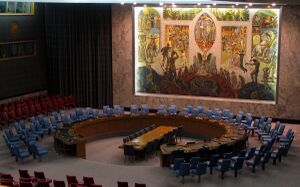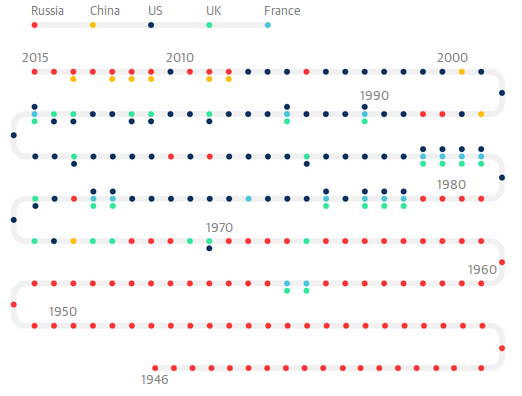UN/SC
(IGO, UN) | |
|---|---|
 | |
| Abbreviation | UNSC |
| Parent organization | |
| Leader | President of the United Nations Security Council |
| Type | international |
| Subgroups | • • United Nations/Security Council/Counter-Terrorism Committee Executive Directorate |
| Subpage | •UN/SC/Counter-Terrorism Committee •UN/SC/President •UN/SC/Resolutions Critical of Israel •UN/SC/Vetoes |
| Membership | • China • • Russia • • USA In addition to the permanent members above (who have veto powers), there is a rotating membership of 10 more who don't. |
| The military arm of the UN. It is able to change rules in the UN Charter, and is able as only UN entity to send or deploy the military of the UN and its permanent members to countries. It hasn't proved to be very consistent and is often in a stalemate because of veto powers and deep lobbying. | |
The United Nations Security Council (UNSC) is one of the six principal organs of the United Nations and is charged with the maintenance of international peace and security, accepting new members to the United Nations and approving any changes to the United Nations Charter. It has 5 permanent members (Russia, UK, France, China, USA) and 10 members rotate on an annual basis with all full members of the UN eligible to serve.
Powers of the UN Security Council include the establishment of peacekeeping operations, the imposition of international sanctions, and the authorisation of military action through Security Council resolutions; it is the only UN body with the authority to issue binding resolutions to member states. The UNSC held its first session on 17 January 1946.
Contents
Vetoes
| Is the United Nations a Failed Organization? |
The five permanent members (P5) have the power of veto over the adoption of proposed substantive resolutions. The veto was used extensively by the Soviet Union from 1946 up to 1970, then in the 1980s and 1990s extensively by USA (often to prevent Israel from censure). More recently Russia – which replaced the Soviet Union in 1991 – and China – which became a P5 member in 1971 – tend to deploy their vetoes the most:
Arms Production
The 5 permanent UN Security Council members were all in the top 6 nations worldwide as regards arms export from 2012-2016.[1]
A Document by UN/SC
| Title | Document type | Publication date | Subject(s) |
|---|---|---|---|
| Document:United Nations Security Council Resolution 2166 | legal document | 21 July 2014 | Malaysia Airlines Flight 17 |
Known members
All 5 of the members already have pages here:
| Member | Description |
|---|---|
| China | The most populous nation state in the world |
| France | A European nation, former colonial power, permanent seat on the UNSC |
| Russia | The largest nation state in the world |
| UK | The biggest Island in Europe. It was a world power with massive influence for over 4 centuries. |
| US | The United States is the single biggest military spender in the world, with a higher 2020 expenditure than the next ten countries combined. Its infrastructure has been described to be in disrepair since the late 1980s. |
Related Documents
| Title | Type | Publication date | Author(s) | Description |
|---|---|---|---|---|
| Document:Existence vs Expansion | blog post | 21 July 2024 | Craig Murray | The International Court of Justice Advisory Opinion is extremely lucid and decisive. The ball is now back in the court of the UN General Assembly, which requested the Opinion. The General Assembly now should move to suspend Israel’s membership of the United Nations. That is the next project on which I shall be working. |
| Document:Gaddafi's 2009 speech: "Let's call it the UN Terror Council" | Speech | 23 September 2009 | Muammar Gaddafi | No one is above the UN General Assembly. All nations should be and should be seen to be on an equal footing. At present, the UN Security Council is security feudalism, political feudalism for those with permanent seats, protected by them and used against us. It should be called, not the UN Security Council, but the UN Terror Council. |
| Document:Has International Law Survived, or Has the Western Political Class Killed It? | blog post | 28 January 2024 | Craig Murray | Now think of this: the very next day after President Herzog made a genocidal statement, as determined by the International Court of Justice, he was met and offered “full support” by Ursula von der Leyen, President of the European Commission and Roberta Metsola, President of the European Parliament |
| Document:Hunger As A Weapon | article | 17 February 2014 | Franklin Lamb | On the US's exploitation at the UN Security Council of humanitarian suffering in Syria to cynically further its policy aims. |
| Document:Libya: Fine, but why Britain | article | 20 March 2011 | Brian Barder | David Cameron seemingly Gung Ho on toppling the Libyan leader, Muammar Gaddafi, while Barack Obama takes a back seat |
| File:Henderson-Testimony-UN.pdf | Transcript | 10 February 2020 | Ian Henderson (OPCW) | Transcript of the testimony of ex-OPCW inspector Ian Henderson before the UNSC on 20 January 2020 about the alleged chemical weapons attack in Douma, Syria on 18 April 2018, and the subsequent OPCW report about it. |
